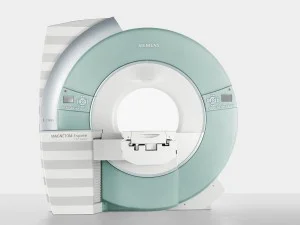An MRI scan uses a large magnet, radio waves, and a computer to create a detailed cross-sectional image of the patient's internal organs and structures.
An MRI scan differs from CT scans and X-rays because it does not use ionizing radiation that can be potentially harmful to a patient.
The development of the MRI scan represents a huge milestone for the medical world, as doctors, scientists, and researchers are now able to examine the inside of the human body accurately using a non-invasive tool.
The following are just some of the examples where an MRI scanner is used:
Abnormalities of the brain and spinal cord
Tumors, cysts, and other abnormalities in various parts of the body
Injuries or abnormalities of the joints, such as back pain
Certain types of heart problems
Diseases of the liver and other abdominal organs
Causes of pelvic pain in women (e.g. fibroids, endometriosis)
Suspected uterine abnormalities in women undergoing evaluation for infertility

